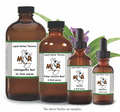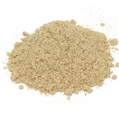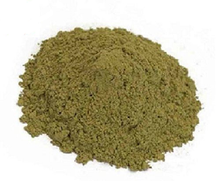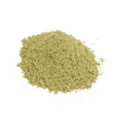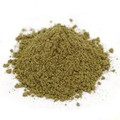 Loading... Please wait...
Loading... Please wait...- Home
- Bulk Herbs
- Herbs (B)
- Basil Leaf Powder
- Home
- Herbs - Organically Grown & Wild Crafted USA
- A-B
- Basil Leaf Powder
- Home
- Herbs from Hawaii
- Basil Leaf Powder
Product Description
Basil Leaf Powder
Also Known As - Ocimum basilicum, Sweet Basil, Garden Basil, and Common Basil. Not to be confused with holy basil (tulsi) used in Ayurvedic medicine.
Organically Grown - Kauai, Hawaii, USA
Overview - From its native India, basil was introduced into Europe in ancient times. Views and traditions associated with the herb have been mixed. Some cultures associated basil with hatred and misfortune; others regarded it as a love token. Dioscorides said that it should never be taken internally, while Pliny recommended smelling it in vinegar for fainting fits. In Ayurvedic medicine, basil is known as tulsi and the juice is widely used. In India, basil is perhaps the most sacred plant, next to the lotus.
Medicinal Uses - Basil's usefulness is generally associated with the stomach and its related organs. It can be used for stomach cramps, gastric catarrh, vomiting, intestinal catarrh, constipation, depression, menopause, and enteritis. As an antispasmodic, it has sometimes been used for whooping cough. Basil has also been recommended for headache. It increases the appetite, tends to increase the flow of milk, improves blood circulation, enhances the digestion, good for coughs, relieves gas pains, and is an aid for indigestion. Treats fevers (tea made with basil and peppercorns reduces fever), colds, flu, coughs, sinusitis, stomach cramps. The leaves are good for rubbing on insect bites. Externally, it is used to soothe bloodshot eyes and relieve itching from hives.
Parts Used - Dried leaf in teas or essential oils for topical application.
Preparations - The essential oil used topically.
- Infusion: steep 1 tsp. dried herb in 1/2 cup water. Take 1 to 1 1/2 cups a day, a mouthful at a time. Can be sweetened with honey if taken for a cough
Companion Plants - Plant with tomatoes to improve growth and flavor. Basil also does well with peppers, oregano, asparagus and petunias. Basil can be helpful in repelling thrips. It is said to repel flies and mosquitoes. Do not plant near rue or sage.
Precautions - The safety of the herb has not been established for pregnant women, nursing mothers, or children under six.
Disclaimer - These products are not intended to diagnose, treat cure or prevent any disease. Reviews are not intended as a substitute for appropriate medical care or the advice of a physician or another medical professional. Actual results may vary among users. Mountain Maus Remedies LLC makes no warranty or representation, expressed or implied, as to the accuracy or validity of the information contributed by outside product review submissions, and assumes no responsibility or liability regarding the use of such information. The information and statements regarding the dietary supplements have not been evaluated by the Food and Drug Administration. If you have a medical condition or disease, please talk to your health care provider. If you are currently taking a prescription medication, you should work with your health care provider before discontinuing any drug or altering any drug regimen, including augmenting your regimen with any herb or dietary supplements. Do not attempt to self-diagnose any disease or ailment based on the reviews and do not use the information contained herein for diagnosing or treating a health problem or disease. Proper medical care is critical to good health. If you have a health concern or suspect you have an undiagnosed sign or symptom, please consult a physician or health care practitioner.
© Mountain Maus Remedies. All Rights Reserved







